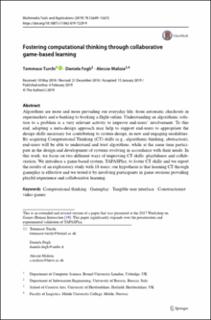Fostering computational thinking through collaborative game-based learning
Peer reviewed, Journal article
Published version

Åpne
Permanent lenke
https://hdl.handle.net/11250/3095476Utgivelsesdato
2019Metadata
Vis full innførselSamlinger
- Artikler [412]
- Publikasjoner fra Cristin [429]
Originalversjon
Multimedia Tools and Applications. 2019, 78 (10), 13649-13673. 10.1007/s11042-019-7229-9Sammendrag
Algorithms are more and more pervading our everyday life: from automatic checkouts in supermarkets and e-banking to booking a flight online. Understanding an algorithmic solution to a problem is a very relevant activity to improve end-users’ involvement. To this end, adopting a meta-design approach may help to support end-users to appropriate the design skills necessary for contributing to system design, in new and engaging modalities. By acquiring Computational Thinking (CT) skills (e.g., algorithmic thinking, abstraction), end-users will be able to understand and trust algorithms, while at the same time participate in the design and development of systems evolving in accordance with their needs. In this work, we focus on two different ways of improving CT skills: playfulness and collaboration. We introduce a game-based system, TAPASPlay, to foster CT skills and we report the results of an exploratory study with 18 users; our hypothesis is that learning CT through gameplay is effective and we tested it by involving participants in game sessions providing playful experience and collaborative learning. Keywords: computational thinking, gameplay, tangible user interface, constructionist video games
